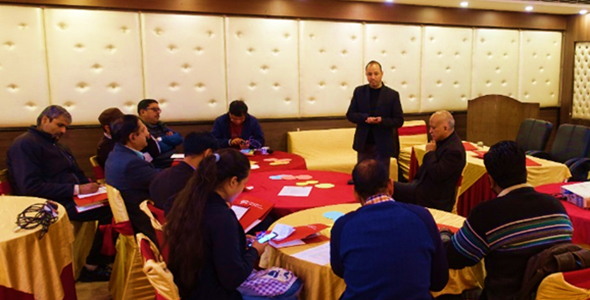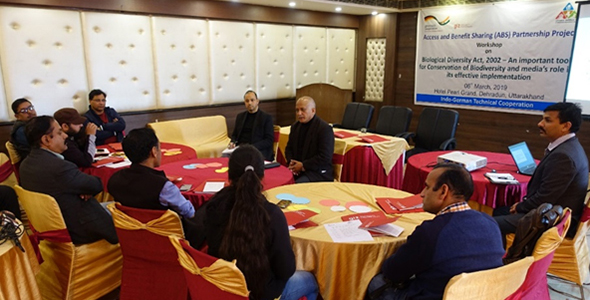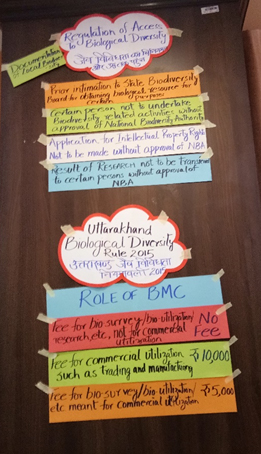06 Mar, 2019
“Community is the custodian of Bio-resources and Biodiversity Act, 2002 gives the power to the communities. This Act will benefit the community of the state through fair and equitable benefit sharing by the industries through State Biodiversity Board. In order to achieve this, State Biodiversity Board is forming Biodiversity Management Committees (BMCs) at Block and Village level”—Mr. S.S. Rasaily, Member Secretary Uttarakhand Biodiversity Board (UBB) at the workshop on conservation of biodiversity and role of media in effective implementation of the Act.
The workshop was jointly organised by the Uttarakhand Biodiversity Board and ABS partnership project of Deutsche Gesellschaft für Internationale Zusammenarbeit (GIZ) GmbH at Dehradun, Uttarakhand on 6 March 2019. The main objective of the workshop was to sensitise people via media and communicate the role and advantages of the Biodiversity (BD) Act, 2002. Mr. S.S. Rasaily, Member Secretary of Uttarakhand Biodiversity Board, shared information on the BD Act with the participants.

Welcome by GIZ

Mr. SS Rasaily briefing the journalists about BD Act 2002
Eminent journalists from renowned media organisations, such as the Times of India, Hindustan times, All India Radio (AIR), Rashtryia Sahara, Shah Times, Dainik Jagran, Dainik Bhaskar, News 18, Hindi Khabar, Punjab Kesari as well as Mass Communication Interns from Doon University and other Institutions participated in the workshop.
The Member Secretary of the Uttarakhand Biodiversity Board briefed the participants about the Act and their achievements so far. He shared that nearly 1000 BMCs have been constituted at different levels in the state, by the Board and that the target was to form BMCs at local level. He added that as part of Access and Benefit Sharing (ABS), 1256 companies have been identified for benefit sharing and notices have been served for compliance. So far, 84 companies have come forward for the payment of ABS. As per the provisions of the Act, 95% of the ABS will go back to the BMCs for conservation and management of the resources. He also shared the status of PBR in the state as well as the fact that traders of bio-resources in the state are currently not being considered by the Board for ABS.
Deutsche Gesellschaft für Internationale Zusammenarbeit (GIZ) presented the Indo-German ABS partnership project and the activities implemented as part of the project. They shared that awareness; capacity development and development of good practices related to benefit sharing are being developed in the three states of Uttarakhand, Tamil Nadu and Maharashtra. Development of a nationally recognised IT monitoring system for the National Biodiversity Authority is also in the works. As part of the activities, various training programmes, awareness workshops and seminars are being undertaken and implemented. In the state, GIZ is developing models for conservation via BMCs in Almora and Pithoragarh which will be a landmark for BMC-based conservation through ABS.

The workshop gave the participants an opportunity to ask questions related to the Biodiversity Act and ABS. The people from the media enquired about the status of companies, different slabs of benefit sharing and the mechanism for ploughing back of ABS money. Mr. S.S. Rasaily, addressed their queries and emphasised the significant role of the media in communicating the message of ABS to the people of the state.
© 2014 IGBP. All Rights Reserved.
Site By: Virtualpages
